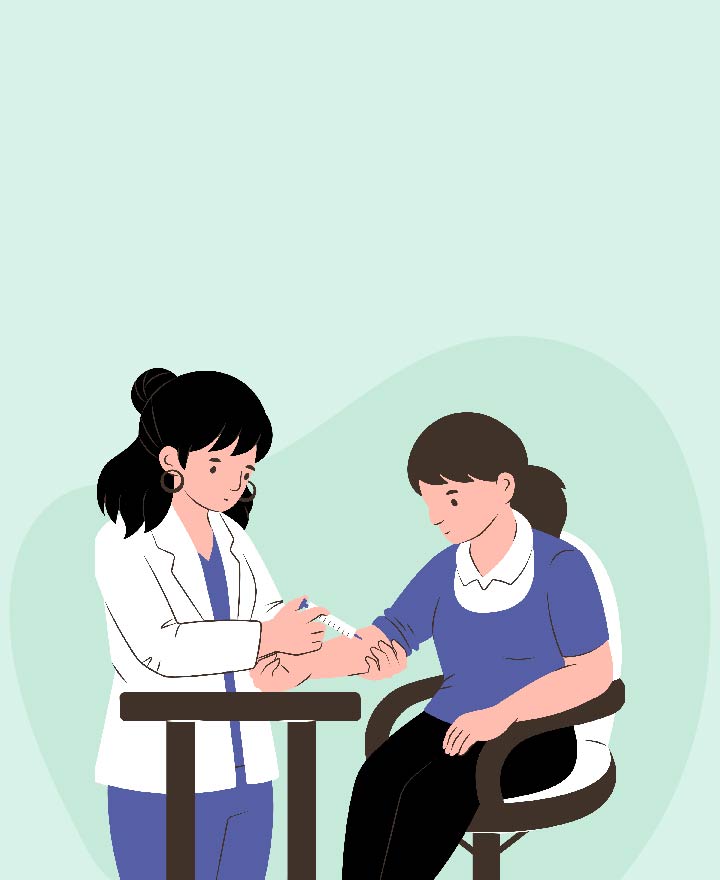

Thalassemia Disease: Types, Symptoms and Treatment
Thalassemia is a blood disorder that impacts how your body makes red blood cells. It's like your blood doesn't have enough strength to carry oxygen throughout your body. Some people with thalassemia need regular blood transfusions or even a bone marrow transplant to feel better. Read on to learn more about this condition.
What is Thalassemia disease?
Thalassemia is a genetic blood disorder wherein your body does not make enough haemoglobin, leading to fewer healthy red blood cells. If left untreated, this condition causes anaemia, which can make you feel weak, tired, or short of breath.
Red blood cells have an important role in providing oxygen to tissues in the body. With less healthy red blood cells, your body’s cells can’t get enough oxygen to make energy and thrive.
If you have thalassemia, you may need occasional or frequent blood transfusions, depending on how severe your condition is.
Types
1. Alpha Thalassemia
This occurs when there is a defect in the alpha globin genes. People inherit four alpha globin genes, two from each parent. The severity of alpha thalassemia depends on how many genes are defective or missing.
• One defective gene:
No symptoms or mild anaemia (Alpha thalassemia minima)
• Two defective genes:
Mild anaemia (Alpha thalassemia minor)
• Three defective genes:
Moderate to severe symptoms, often referred to as Haemoglobin H disease
• Four defective genes:
A life-threatening condition known as hydrops fetalis, where a baby is unlikely to survive
2. Beta Thalassemia
In this type of thalassemia, the beta globin genes are affected. People inherit two beta globin genes, one from each parent.
• One defective gene:
Mild symptoms or none at all (Beta thalassemia minor)
• Two defective genes:
Severe symptoms can be seen in this form of the ailment (Beta thalassemia major or Cooley’s anaemia), where individuals often need regular blood transfusions.
Symptoms
The symptoms of thalassemia disease can be different depending on how severe it is. Mild forms might present no symptoms, while severe forms can cause:
• Fatigue
• Pale or yellowish skin (jaundice)
• Shortness of breath
• Delayed growth in children
• Bone abnormalities
• Enlarged spleen
Causes
Haemoglobin is made of two protein chains called “alpha globin” and “beta globin”. You can develop thalassemia if you have faulty genes that prevent the body from making the correct amount of alpha globin or beta globin chains. In such a situation, red blood cells can’t take enough oxygen to your body’s organs and tissues.
Both alpha and beta chains carry genes passed down from one’s parents. You'll develop thalassemia if any of these genes are defective or missing.
Risk Factors
Thalassemia is a family trait passed down from parents to their children. It's caused by defects in the genes that help make haemoglobin, the protein that carries oxygen in the blood. People who have family roots in places where malaria used to be a big problem, like Africa, Southern Europe, and parts of Asia, are more likely to have thalassemia.
Diagnosis
Thalassemia disease is diagnosed through blood tests, including:
• A complete blood count (CBC) to check haemoglobin levels
• Genetic tests to identify the specific gene mutation
• Haemoglobin electrophoresis to analyse the different types of haemoglobin present
Treatment
The treatment for thalassemia disease depends on its type and severity. Common treatments include —
• Blood transfusions:
For severe cases, regular blood transfusions are necessary.
• Iron chelation therapy:
This treatment helps remove excess iron caused by frequent transfusions.
• Folic acid supplements:
These can help stimulate red blood cell production.
• Bone marrow transplant:
This is the only potential cure but requires a compatible donor.
FAQs
Can we stop thalassemia before it even starts?
Unfortunately, there's no way to completely stop thalassemia from happening. But if you're thinking about having a baby and you or your partner have thalassemia, talking to a genetic counsellor can help.
Is thalassemia life-threatening?
Thalassemia can be life-threatening in severe cases. But with the right treatment, people with thalassemia can live normal lives.
Conclusion
Thalassemia makes you feel tired, weak, and devoid of energy. However, seeking timely medical attention, like getting regular blood transfusions or taking prescribed medications, can help you manage it and live a normal life.
One of the important components of our overall wellness is also being financially secured. Healthcare emergencies can happen any time, but a good health insurance policy can protect you from such uncertain situations. To know more about Wellness and other health related tips, visit the wellness corner.
Disclaimer: This blog provides general information and discussions about health and related subjects. The information and other content provided in this blog, website or any linked materials are not intended and should not be considered or used as a substitute for medical advice, diagnosis, or treatment. Kindly contact your doctor before starting a new medicine or health regime.
Related Articles
Jaundice - Symptoms, Causes & Treatment
Anemia During Pregnancy - Types, Symptoms And Treatment
Raynaud's Syndrome - Symptoms, Causes & Treatment
Cardiovascular Disease - Types, Causes & Symptoms
Published on May 05, 2025















 Health Insurance
Health Insurance  Travel Insurance
Travel Insurance  Car Insurance
Car Insurance  Cyber Insurance
Cyber Insurance  Critical Illness Insurance
Critical Illness Insurance
 Pet Insurance
Pet Insurance
 Bike/Two Wheeler Insurance
Bike/Two Wheeler Insurance  Home Insurance
Home Insurance  Third Party Vehicle Ins.
Third Party Vehicle Ins.  Tractor Insurance
Tractor Insurance  Goods Carrying Vehicle Ins.
Goods Carrying Vehicle Ins.  Passenger Carrying Vehicle Ins.
Passenger Carrying Vehicle Ins.  Compulsory Personal Accident Insurance
Compulsory Personal Accident Insurance  Travel Insurance
Travel Insurance  Rural
Rural